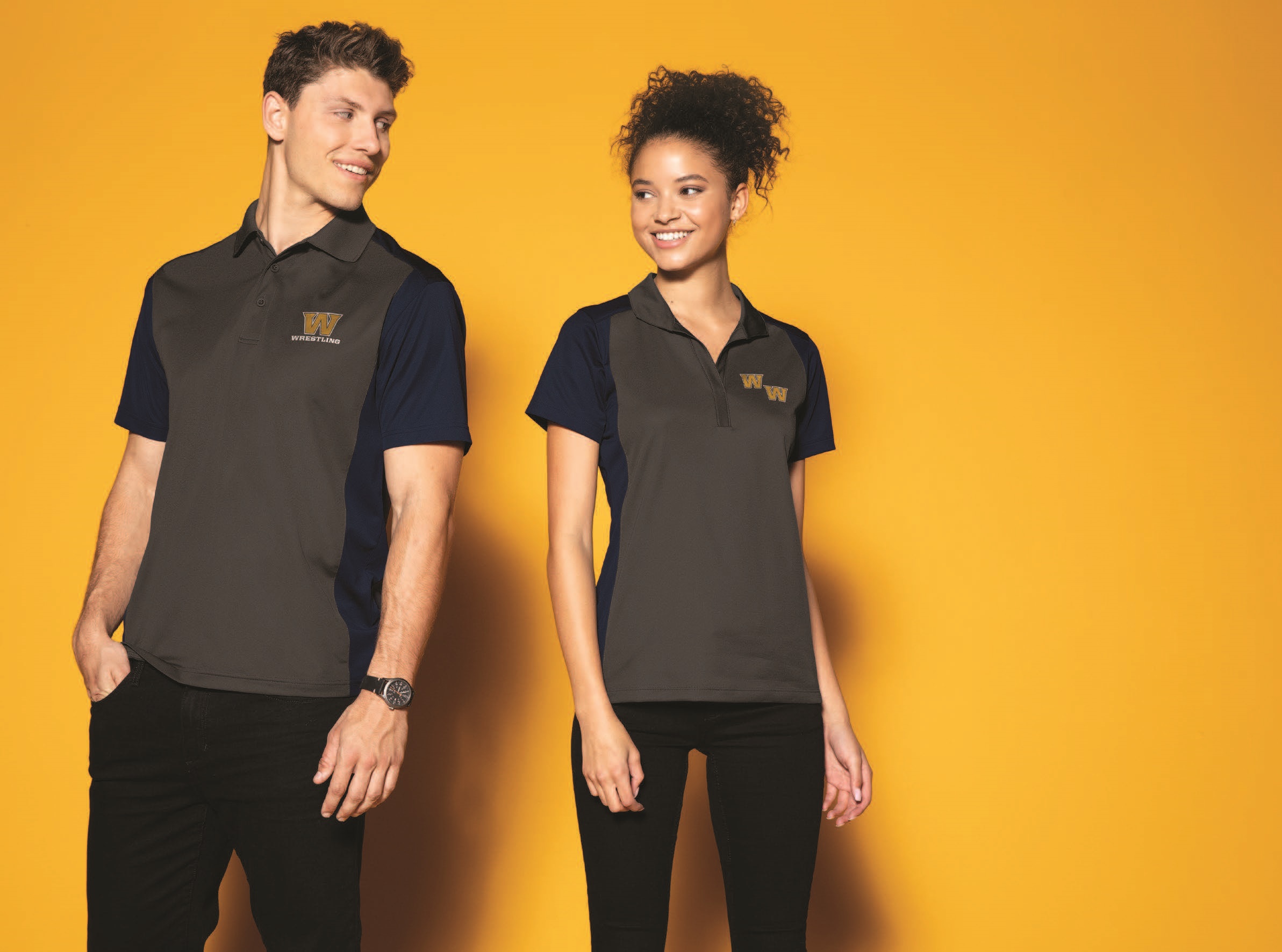Clothing: it’s one of of the most apparent ways we express our personalities. When it comes to corporate apparel, there are more options than ever before. So how do you navigate the seemingly endless garments on the market today and make sure your clients are best dressed in 2014? It comes down to identifying your client’s brand’s attributes and aligning these attributes with garments through color, fabric and fit.
A Rainbow Of Colors
Gone are the days when corporate apparel was only available in basic red, navy, black and white. Today’s styles are offered in a virtual rainbow. Of course you can match garments to corporate colors, but you can also integrate complementary colors into the mix to be on-trend.
For Spring 2014, PANTONE has built a palette of 10 colors that will be seen from the runway to the boardroom. It begins with the pale pastels of placid blue, violet tulip and hemlock (green) and moves into the bright freesia (yellow), cayenne (red), celosia orange, radiant orchid (the color of 2014) and dazzling blue. Combine any of these with neutrals paloma (gray) or sand.
Mary Bostwick, director of marketing for Duluth, Georgia-based Delta Apparel, which carries 59 colors of T-shirts, said the company bases its color research on industry information, trend houses and trade shows across the country as well as on top customers who own hot licenses in the marketplace and what their needs are.
She noted that neon orange, green and pink have been trending for the last 12 months and continue to be hot. “Neon colors are popular in beach stores, restaurants and bars, as well as in the hospitality industry, such as vacation destinations and hotel gift shops,” she said. “In addition to the light or sunwashed-looking neon colors that have sold well, we have received requests for the more brilliant colors and have added those to the lineup as well.”
At Avenel, New Jersey-based Vantage Apparel, marketing director Gina Barreca says she is seeing retail-inspired colors such as royal, red and citron show up in solids, patterns and textures. “These bold colors are often paired with basics or neutrals such as black, navy, white and gray to create balance within the collection,” she said.
Mark Trotzuk, president of Vancouver, British Columbia, Canada-based Boardroom ECO Apparel, mentioned that color selection can be risky for some, but there are many ways to integrate color tastefully. “You can make a traditional black jacket feel current simply by adding trendy green accents, trim, etc. so that it’s classy to wear but still integrates the logo or brand colors without being overwhelming.”
A Decoration Technique To Get Brands Noticed
The decoration makes all the difference. So what techniques will get your clients’ logos noticed in 2014? “With so many technical fabrics and products, performance decoration becomes more prevalent,” Barreca said. “Laser etching or tonal printing are great complements to performance styles leaving an upscale tonal mark without any backing. Heat transfers are also a perfect screen-printing alternative for lighter-weight fabrics and small-run programs,” she explained, adding that spot-color printed transfers and 3M silver reflective material are popular as well. She suggested looking for unique decoration placements like on the upper shoulder, along the front zipper or on the side block panels.
A Garment Unlike Any Others
While promotional apparel designs follow what happens at retail, Trotzuk notes there is often a year or two delay before these trends are seen in our market. “This is not necessarily bad, because within this timeframe the trendy styles become more accepted and mainstream,” he explained. “But if it takes three-to-four years for these trends to come out, it’s too long,” he added.
For the more fashion-forward brands that want to integrate the “it” styling into their corporate apparel now, custom cut-and-sew is the way to go. “With custom cut-and-sew, being able to decorate garments prior to assembly is where the magic happens,” Trotzuk said. “For example, part of a sleeve can be sublimated on one panel, then it can be sewn into the shirt for a completely unique look. You could do a tone-on-tone gel print, where the gel is clear and makes that area on the shirt darker. Discreet logos are becoming more prevalent; it’s not all about left chest imprint anymore.”
Want more ideas for customization? Change the color on the inside of a collar or placket. Sublimate the cuffs on a long-sleeve shirt where the imprint is only seen when the sleeves are rolled up. Either of these interior trims can be done with solid fabric or an imprinted step-and-repeat logo. Add colored buttons to match a logo or include contrasting buttonhole stitching for added interest. “It doesn’t cost a lot of money to add these design features when building the garments, but the end result is so much better and represents the brand culture and integrity,” Trotzuk says.
A Way to Land Clients
From private labels and special fabrics to cool embellishments, custom corporate apparel gives brands the ultimate control over the look and message they want to send. And your client doesn’t have to be a large corporation or have a huge budget to do it. Trotzuk mentioned that domestic production on Boardroom ECO Apparel’s clothing begins at 48 pieces.
Whether you have clientele with big budgets or just big-brand marketing aspirations, Trotzuk’s advice was to wow them to land the business. Apparel can do that for you. “Companies with big-brand integrity need cool garments designed specifically around their culture to meet the unique needs of their industry,” Trotzuk said.
A Sustainable And Responsible Product
Sustainable manufacturing practices and corporate responsibility never go out of style. And these issues are becoming more and more important, especially to big-budget end-buyers.
“Fortune 500 customers want compliancy statements,” Trotzuk said. “Corner offices are now being held by 30-somethings; these buyers and decision-makers are concerned about sustainability and responsibility,” he explained. “For example, Disney went from $14 million to $28 million budgeted for audits alone last year. Now and in the future, these large corporations won’t put their logo on a risky product. There’s too much at stake. They must know where the product is made and how it’s made. It’s a big deal to them, and it must be a big deal for us as an industry to comply.”
A Stylish New Year
Overall, Barreca stated that 2014 corporate apparel trends will revolve around innovative performance fabrications, more styling and attention to detail, contrasting color accents, and decoration methods and placements that correlate within product categories.
Whatever trends you incorporate into your sales mix, Trotzuk warned that today’s buyers are much more informed, so you must do you homework. “Marketers are more sophisticated; they’re not the admins of 10 years ago ordering shirts at the boss’s request,” he said. “In order to successfully sell corporate apparel today, distributors must fully understand their client’s culture to put together a collection that aligns with its branding. Because if recipients are not wearing the garments, then dollars are wasted-and we all lose.”
Lisa Horn, CAS, a 19-year industry veteran, is a regular contributor to industry publications and is a Founding Chef and editor-in-chief of PromoKitchen. Also known as @ThePublicityGal, she works with suppliers, distributors and industry service providers on their publicity, content marketing, blogging, catalog, social media and strategic communication efforts. Connect with her at www.linkedin.com/in/lisakhorn and www.facebook.com/lisakhorn.biz, or visit thepublicitygal.com.



